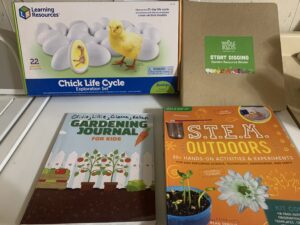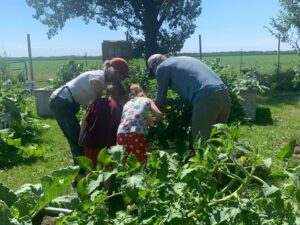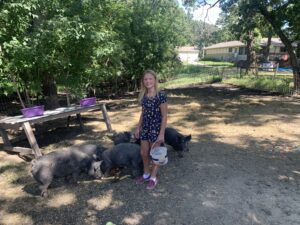Final report for YENC22-182
Project Information
Youth, ages 6-13 years old, will participate in an 11-week farm camp, meeting 2 hours/week, June through August 2022. Youth will learn how to raise a garden bed from planting to harvest with all produce raised being donated to families in need within the community. Youth will also learn about the care and keeping of farm animals as well as what these animals provide for humans. Youth will learn, hands-on, about caring for their environment through activities such as composting, working with pollinators, and learning how to leave no trace behind.
- Increase the gardening skills of 6-13 year olds through an 11-week farm camp program. Each youth will raise a 4x6 raised garden bed from planting to harvest. All produce raised will be given to families in need within the community.
- Youth will learn how composting and recycling can positively impact the environment and gardening practices.
- Youth will learn the importance of pollinators through the enhancement of a current pollinator garden.
- Youth will learn the importance of family farms to the food supply through interaction with food suppliers, farmers, and cooking lessons using the produce they grow.
Cooperators
- (Educator)
- (Educator)
- (Educator)
- (Educator)
Educational & Outreach Activities
Participation Summary:

Harvesting Hope for Others Farm Camp for youth ages 6-13 years old took place June 1-August 17, 2022. Two sessions took place each Wednesday for a total of 43 youth. During this time each youth raised a 4x6 garden bed (or similar stock tank) from planting to harvest. In addition to raising their gardens, youth learned how to care for farm animals including pigs, sheep, chickens, and llamas. Youth were encouraged to taste and sample produce each week of harvest and to bring produce home to their families. All remaining produce was donated to 26 families participating in our Free Produce Box Program. Since June 2022, this program has raised over 2200 pounds of produce for families in need in our community.
Additional activities indicated above included the following:
- Five agriculture lessons demonstrated by the NDSU Plant Science Department - (worms, feed, pollinators, composting, no-till).
- Pollinator Garden Demonstration
- STEAM Projects - air and rain, what grows on your shoes, ice cream in a bag, butter in a jar
- Fleece and wool demonstrations
- Tree health and aging - ND Forestry Department
- How to cook over a fire
Pictured above are some of the resources we used to teach and plan activities for our campers. This included teaching them, hands-on, about the life cycle of chickens and where their eggs and meat come from. Using garden journals to plan, log and track their gardens. The Whole Kids Foundation Garden Curriuculum has been a great resource for lessons in and outside the garden and the STEM Curriculum supplemented our need to teach all areas of the child. We also learned from our guest presenters from NDSU, ND Forestry, animals experts in the field and experiences from our farming volunteers and mentors.
Outreach Activities:
- Mid-Summer Celebration - Family Day in the Garden - July 20th - Farm Camp youth invited their families to visit the farm for a youth guided tour and demonstrations.
- Harvest Hope Farm Newsletter - August 2022 - Featured an article about farm camp written by a camper.
- Online Newsletter August 2022 - featured the same article about farm camp written by a camper. https://www.harvesthopefarm.org/so/c3OBlR-NM?languageTag=en#/main
- Speaking engagements to local service organizations - July 12, 2022 and August 17, 2022 - total 60 adults.
- Social Media posts are ongoing highlighting our farm camp programs. Follow us on Facebook and Instagram @HarvestHopeFarm
Learning Outcomes
Sustainable food resources.
How to be good stewards of their environment.
Importance of being good to people and animals.
Importance of giving back to the community.
Leadership skills/confidence.
Importance of pollinators and pollinator gardens.
Harvesting Hope for Others Farm Camp 2022 resulted in growth both in the number of youth attending camp, the number of youth and adults that visited the gardens and the growth in the youth attending the camp. Youth attending Farm Camp saw an increase in social emotional development per report from their parents. These youth increased in leadership skills, confidence, perseverance, patience and the ability to work together to get jobs done.
Farm Camp grew in registered campers from 2021 as well. This year 43 youth registered for farm camp with 41 youth completing the entire program. Two youth who dropped out were unable to continue due to scheduling difficulty. Additionally, during summer 2022, 106 youth visited the gardens during farm tours that were school/club related, allowing us to educate these youth in addition to the youth attending Farm Camp.
Finally, this year we hosted our first Mid-Summer Farm Camp Celebration in which we invited the youth to bring their families to the farm for Farm Camp. This was a day in which our campers self-guided their families around the farm and taught them about what they had learned so far. They also had the opportunity to visit a fleece demonstration, make homemade butter in a jar and make bee houses. These was a very well received event and will become part of our regular summer programming. 
Farm Camp 2022 met all objectives outlined in the spring of 2022. Each youth attending camp learned how to raise and care for a 4x6 or similar garden bed that they were responsible for during the 11-week camp. The youth learned the importance of composting both for the gardens and for our environment. They learned all aspects of preparing, planting, weeding, watering and harvesting their gardens.
Youth learned about pollinators and why they are important as well as the importance of pollinator gardens and how these can increase the production of vegetation.
Youth learned about their environment through hands-on STEAM activities as well as structured and unstructured activities in nature.
Youth also learned about healthy eating and why it is important to try new foods, especially colorful foods from the garden. Each week during harvest we sampled new produce and youth had the opportunity to take this home with them for their families to try.
Project Outcomes
Harvest Hope Farm has seen amazing support within the community, especially from schools, to continue and build on teaching about sustainability. Particularly, schools are interested in HHF bringing our Farm Camp on Wheels program into their schools.
As part of our Farm Camp, youth and families were encouraged to bring compost to the farm each week. This compost was used in the gardens as well as to supplement feed for the pigs and chickens. The youth and their parents learned about collecting food scraps and grass clippings that could be used to feed animals and help make the soil in the gardens more nutrient rich, rather than putting these items into the landfill.
Youth and parents also received education about how to raise a garden from planting to harvest and potentially have a year around garden using a hydroponic garden. They learned about the benefits of a hydroponic garden and the ability to grow one anywhere, even in small spaces indoors.
We appreciate your assistance and support of our Harvesting Hope for Others Farm Camp for Youth. This program has allowed us the opportunity to share the farm with you who otherwise would not be able to do so.
